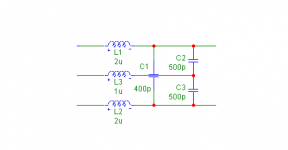Oh really? Are there no IEEE standards for shielding, line and load regulation, and AC ripple? No regulations for impedence. No standard for rating power supplies capabilities according to established specifications and accepted test procedures? What about FTC or can you just make any claim for any power supply?
That is correct there are no IEEE standards it is covered by UL which is now following IEC practice. The main issues are safety! The FTC relaxed the rules on power amplifiers and if you find any concerning audio equipment internal power supplies let me know.
I haven't done it, however, none of it explains audible differences between different power cords and power distribution boxes.
Try it, it ain't hard. Let me know.
There are no IEEE standards for subjective differences with line cords. That is the important problem that needs to be discussed. (Life member of the IEEE, please remember)
Simon, usually we use power cords that are KEYED and consistent to each other. Reversing is but another variable.
Oh really? Are there no IEEE standards for shielding, line and load regulation, and AC ripple? No regulations for impedence. No standard for rating power supplies capabilities according to established specifications and accepted test procedures? What about FTC or can you just make any claim for any power supply?
None of the above determines the inner PSU's immunity against RFI carried on the mains supply.
Try it, it ain't hard. Let me know.
I will. However, right now I'm in the process of installing isolation transformers to various pieces of gear. They may change the picture.
None of the above determines the inner PSU's immunity against RFI carried on the mains supply.
If there are no standards and no measurements, how do you know a different power cord works? How does it work, shunt capacitance? Series inductance? A few pf added to all those hundreds of ufs in all of the rest of the wire? Say are you in the audiophile power cord business?
Oh really? Are there no IEEE standards for shielding, line and load regulation, and AC ripple? No regulations for impedence. No standard for rating power supplies capabilities according to established specifications and accepted test procedures? What about FTC or can you just make any claim for any power supply?
Simon is referring to the transformer hot side of the mains may be outside the windings or the inner part of the windings next to the laminations, there is no standard for that. He has discussed that earlier in this thread.
Wrinkle.
I will. However, right now I'm in the process of installing isolation transformers to various pieces of gear. They may change the picture.
Save your money, try it first
I have heard differences in power cords too. I guess that is a subjective 'fact'.
Being a big skeptic when it comes to AC cord "cable magic" and their influence on sound after rectification I have to agree that I too have heard differences.
Whether this is due to quality of materials, geometry, shielding, connectors or listening room humidity I don't know. I suppose there are as many theories as their are skeptics.
I wouldn't call them facts, maybe more like eyewitness testimony. 😀
If there are no standards and no measurements, how do you know a different power cord works?
Some do work as quite efficient low pass filter (at 2 - 3 MHz) /like VDH Mainsstream ** hybrid/. I have measured these cables.
P.S. this stupid engine has erased two characters ....
If there are no standards and no measurements, how do you know a different power cord works?
By listening to the sound of the stereo set.
How does it work, shunt capacitance? Series inductance?
I don't know how it works. All I know is that it works.
Say are you in the audiophile power cord business?
I'm in no business, I'm fully retired.
Save your money, try it first
Isolation transformers are indispensable. This is from experience.
Some do work as quite efficient low pass filter (at 2 - 3 MHz) /like VDH Mainsstream ** hybrid/. I have measured these cables.
Isolation transformers, having built-in RFI filters, may eliminate audible differences between different power cords. I will know it within a week or two.
Isolation transformers, having built-in RFI filters, may eliminate audible differences between different power cords.
No. I know the answer right now.
No. I know the answer right now.
I accept your findings. Actually, it makes sense.
PMA, I think you are on to something important. (Based on classified info from another line cord builder).
By listening to the sound of the stereo set.
I don't know how it works. All I know is that it works.
I'm in no business, I'm fully retired.
Wouldn't it be cheaper and more certain just to buy an RF filter?
- Status
- Not open for further replies.
- Home
- Member Areas
- The Lounge
- John Curl's Blowtorch preamplifier part II
